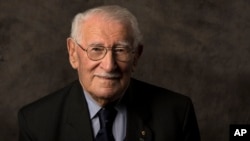Tributes are being made for Eddie Jaku, one of the last remaining survivors of Auschwitz, who died in Australia at 101.
Eddie Jaku described himself as the “Happiest Man on Earth.” In fact, that was the title of his bestselling autobiography, which was released when he was one hundred years old.
Friends and family remember a man who, they say, lived a remarkable life. He was born Abraham Jakubowicz in Leipzig, Germany to a Jewish family. He was 18 years old when he was sent to the first of four concentration camps, which included Auschwitz, where the Nazis murdered his parents in the gas chambers. Jaku was spared because of his engineering skills. He wrote that the camp was “a living nightmare.”
In 1945, Soviet forces moved closer to Auschwitz as the war neared its end. The camp was evacuated, and prisoners were forced on notorious death marches. Jaku eventually escaped and hid in a cave, eating slugs and snails to survive. He was seriously ill when he was later rescued by American soldiers, but he recovered and moved to Australia in 1950. After the Second World War, about 27,000 survivors of the Holocaust migrated to Australia.
Jaku became a volunteer at the Sydney Jewish Museum, sharing his story with visitors.
Aviva Wolff, the museum’s operations manager, told the Australian Broadcasting Corp. that Jaku was an inspiration.
“He came out with such positivity. He always had time for everyone. He always had a smile on his face. You know, at 101, he drove himself to the museum, and I literally, daily, get postcards, letters, emails — people just wanting to tell Eddie how he has touched their lives, changed their lives,” Wolff said.
In 2013, Jaku was awarded the medal of the Order of Australia, a prestigious civic award, for his service to the Jewish community.
Australian Prime Minister Scott Morrison said Jaku was “an inspiration and a joy.” The New South Wales Jewish Board of Deputies said he had been “a beacon of light and hope.”
Jaku died at a nursing home in Sydney. He is survived by his wife of 75 years, Flore, their two sons, four grandchildren and five great-grandchildren.
Despite the trauma and brutality he had witnessed, he retained a positive outlook and spread messages of peace and forgiveness.




